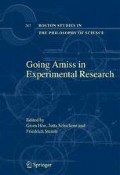Access this chapter
Tax calculation will be finalised at checkout
Purchases are for personal use only
Preview
Unable to display preview. Download preview PDF.
References
Buchwald, J. Z. and A. Franklin (2005). “Introduction: beyond disunity and historicism.” In: Buchwald, J. Z. and A. Franklin (eds.), Wrong for the Right Reasons. Dordrecht: Springer, pp. 1–16.
Hon, G. (1989). “Towards a typology of experimental errors: an epistemological view.” Studies in History and Philosophy of Science 20: 469–504.
Hon, G. (1995). “Going wrong: to make a mistake, to fall into an error.” Review of Metaphysics 49: 3–20.
Hon, G. (2004). “Putting error to (historical) work: error as a tell-tale in the studies of Kepler and Galileo.” Centaurus 46: 58–81.
Mayo, D. (1996). Error and the Growth of Experimental Knowledge. Chicago: Chicago University Press.
Schickore, J. (2005). “‘Through thousands of errors we reach the truth’—but how? On the epistemic roles of error in scientific practice.” Studies in History and Philosophy of Science 36: 539–556.
Further Reading
Allchin, D. (1997). “A twentieth-century phlogiston: constructing error and differentiating domains.” Perspectives on Science 5: 81–127.
Allchin, D. (2001). “Error types.” Perspectives on Science 9: 38–58.
Bates, D. (1996). “The epistemology of error in late enlightenment France.” Eighteenth-Century Studies 29: 307–327.
Cadeddu, A. (2000). “The heuristic function of ‘error’ in the scientific methodology of Louis Pasteur: the case of the silkworm diseases.” History and Philosophy of the Life Sciences 22: 3–28.
Canguilhem, G. (1991). “A new concept in pathology: error.” The Normal and the Pathological. New York: Zone Books, pp. 275–287.
Coen, D. R. (2002). “Scientists’ errors, nature’s fluctuations, and the law of radioactive decay, 1899–1926.” Historical Studies in the Physical and Biological Sciences 32: 179–205.
Elliot, K. (2004). “Error as means to discovery.” Philosophy of Science 71: 1–24.
Gurba, K. and E. Zarnecka-Bialy (eds.) (1998). Philosophy and Error. Krakow: Jagiellonian University Press.
Hon, G. (1998). “‘If this be error’: probing experiment with error.” In: Heidelberger, M. and F. Steinle (eds.), Experimental Essays—Versuche zum Experiment, Baden-Baden: Nomos, pp. 227–248.
Holton, G. (guest ed.) (2005). Errors: consequences of big mistakes in the natural and social sciences, Social Research 72 (special issue).
Janis, A. and T. Horowitz (Eds.) (1994). Scientific Failure. Lanham: Rowman and Littlefields.
Kyburg, H. E. (1992). “Measuring errors of measurement.” In: Savage, C. W. and P. Ehrlich (eds.), Philosophical and Foundational Issues in Measurement Theory. Hillsdale, NJ: Erlbaum, pp. 75–91.
Matthen, M. and E. Levy (1984). “Teleology, error, and the human immune system.” Journal of Philosophy 81: 351–371.
Mellor, D. H. (1965). “Experimental error and deducibility.” Philosophy of Science 32: 105–122.
Mittelstraβ, J. (1999). “Vom Nutzen des Irrtums in der Wissenschaft.” In: Carl, W. and L. Daston (eds.), Wahrheit und Geschichte: Ein Kolloquium zu Ehren des 60. Geburtstages von Lorenz Krüger. Göttingen: Vandenhoeck & Ruprecht, pp. 101–114.
Olesko, K. M. (1995). “The meaning of precision. The exact sensibility in early nineteenth-century Germany.” In: Wise, M. N. (ed.), The Values of Precision. Princeton: Princeton University Press, pp. 103–134.
Petroski, H. (1994). Design paradigms. Case Histories of Error and Judgment in Engineering. Cambridge: Cambridge University Press.
Rasmussen, N. (1993). “Facts, artifacts, and mesosomes: practicing epistemology with the electron microscope.” Studies in History and Philosophy of Science 24: 227–265.
Rescher, N. (2007). Error: On Our Predicament When Things Go Wrong. Pittsburgh: University of Pittsburgh Press.
Rudge, D. W. (2001). “Kettlewell from an error statistician’s point of view.” Perspectives on Science 9: 59–77.
Schickore, J. (2002). “(Ab)Using the past for present purposes: exposing contextual and transcontextual features of error.” Perspectives on Science 10: 433–456.
Staley, K. W. (1996). “Novelty, severity, and history in the testing of hypotheses: the case of the top quark.” Philosophy of Science 63 (Supplement): S248–S255.
Zik, Y. (1999). “Galileo and the telescope: the status of theoretical and practical knowledge and techniques of measurement and experimentation in the development of the instrument.” Nuncius 2: 31–67.
Zik, Y. (2001). “Science and instruments: the telescope as a scientific instrument at the beginning of the seventeenth century.” Perspectives on Science 9: 259–284.
Author information
Authors and Affiliations
Editor information
Editors and Affiliations
Rights and permissions
Copyright information
© 2009 Springer Science+Business Media B.V.
About this chapter
Cite this chapter
Hon, G., Schickore, J., Steinle, F. (2009). Introduction: Mapping “Going Amiss”. In: Hon, G., Schickore, J., Steinle, F. (eds) Going Amiss In Experimental Research. Boston Studies In The Philosophy Of Science, vol 267. Springer, Dordrecht. https://doi.org/10.1007/978-1-4020-8893-3_1
Download citation
DOI: https://doi.org/10.1007/978-1-4020-8893-3_1
Publisher Name: Springer, Dordrecht
Print ISBN: 978-1-4020-8892-6
Online ISBN: 978-1-4020-8893-3
eBook Packages: Humanities, Social Sciences and LawPhilosophy and Religion (R0)

